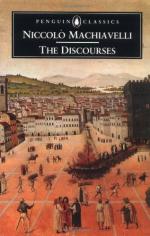
|
| Name: _________________________ | Period: ___________________ |
This quiz consists of 5 multiple choice and 5 short answer questions through Book One, The Development of Rome's Constitution, The Use and Abuse of Dictatorship, The Road to Ruin, Sundry Reflections Based on the Decemvirate.
Multiple Choice Questions
1. In defending his view that Roman Dictators served their city well, what phrase does Machiavelli use to explain how the Caesars absorbed their power?
(a) "Justice and power must be brought together, so that whatever is just may be powerful, and whatever is powerful may be just."
(b) "It is power that easily acquires a name, not a name power."
(c) "He who controls others may be powerful, but he who has mastered himself is mightier still."
(d) "Power corrupts. Knowledge is power. Study hard. Be evil."
2. Why does Machiavelli recommend that those who want to reform a city should retain the appearance of the institutions they want to reform?
(a) Because keeping the appearance of those institutions helps to keep important advisers within the circle of government.
(b) Because the general masses are satisfied with appearances and are moved by things as they appear rather than by the way they operate (perception is reality).
(c) Because keeping the appearance of those institutions assures a smooth transition of power.
(d) Because keeping the appearance of those institutions helps to hide the true agenda of the Prince.
3. What are the five types of government identified by Machiavelli?
(a) Monarchy, aristocracy, democracy, oligarchy, and anarchy.
(b) Republic, fascistic, democracy, principality, and oligarchy.
(c) Democracy, anarchy, monarchy, constitutional, and institutional.
(d) Tyranny, constitutional, military oligarchy, principality, and democracy.
4. What should the reader consider as evil when Machiavelli is advising Princes to "recognize evils".
(a) Evil is those public reactions that oppose the Prince.
(b) Evil should be considered to be any influence which challenges the power of the Prince.
(c) Evil is anything with which a Prince does not agree.
(d) Evil is those human inclinations that cause them to act selfishly.
5. From what did Machiavelli develop the information that he wrote into "The Discourses"?
(a) From his world travels to study governments in other cultures.
(b) From long experience and continuous study of worldly affairs.
(c) From research that he did in the many libraries throughout the former Roman Empire.
(d) From interviews with political thinkers of the day.
Short Answer Questions
1. What does Machiavelli claim causes ingratitude from a conquered citizenry?
2. According to Machiavelli, what caused the Roman Republic to form?
3. What was the inspiration for Machiavelli's "The Discourses"?
4. What does Machiavelli suggest causes corruption?
5. What is the main point Machiavelli investigates as he prepares to discuss the affects of strong Princes and weak Princes?
|
This section contains 542 words (approx. 2 pages at 300 words per page) |

|




